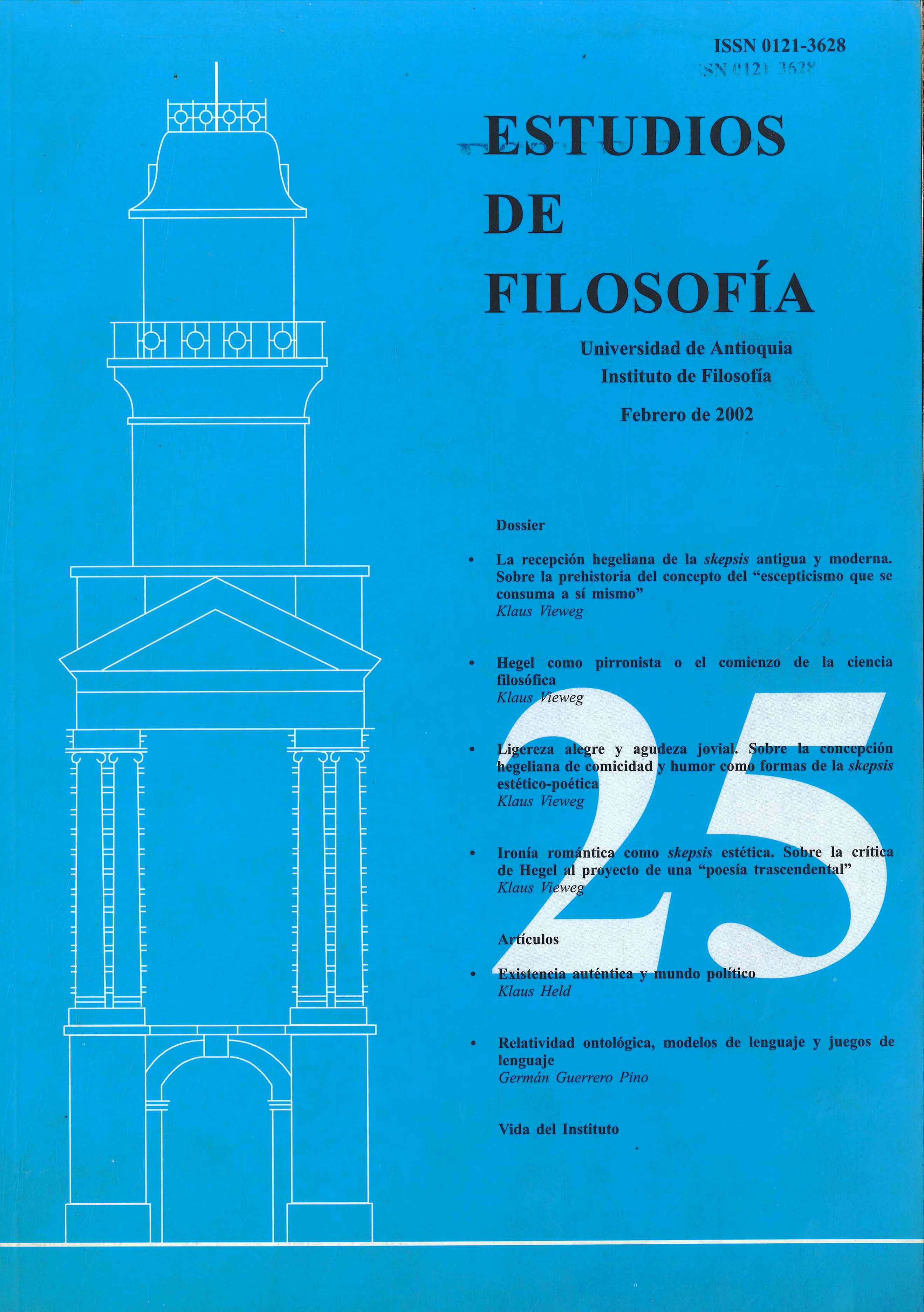Ironía romántica como skepsis estética. Sobre la crítica de Hegel al proyecto de una "poesía trascendental"
DOI:
https://doi.org/10.17533/udea.ef.14989Palabras clave:
ironía, poesía, absoluto, romanticismoResumen
Una comprensión adecuada de la confrontación de Hegel con el concepto de ironía romántica de Friedrich Schlegel sólo puede lograrse mediante una explicación de la relación estructural de negatividad, skepsis e ironía. La relación entre una filosofía de la ironía y una filosofía del absoluto puede ser puesta bajo una nueva luz si se compara la cercanía y la oposición de las estrategias de una skepsis implícita o interna desarrolladas por Schlegel y Hegel. Hegel ve en la ironía de Schlegel una forma de la "negatividad infinita, absoluta”, una figura de una skepsis estética, pero no —como Schlegel— la “skepsis suprema y más pura". En la permanente oscilación de "autocreación y autodestrucción ", en la corriente eternamente alterna de discurso y contradiscurso de pensamiento y contrapensamiento, no se logra en modo a alguno, según Hegel, la integración del escepticismo. El proyecto de una "poesía trascendental'' como intento de una nueva unificación de poesía y filosofía tiene el mismo talón de Aquiies del pirronismo antiguo, el cual oscila entre narración y discurso y —como el asno de Buridán— "muere de hambre " entre los dos. Los ironistas perseveran en la pura negatividad, su incesante y nostálgica actividad semeja una conversación sin resultados. Creatividad crítica, vital y escéptica, y tedio bostezador constituyen para Hegel las dos posiciones extremas del proyecto romántico temprano.
Descargas
Descargas
Publicado
Cómo citar
Número
Sección
Categorías
Licencia
Derechos de autor 2002 Estudios de Filosofía

Esta obra está bajo una licencia internacional Creative Commons Atribución-NoComercial-CompartirIgual 4.0.
Los autores que publican en Estudios de Filosofía acuerdan los siguientes términos:
1. El Autor retiene el copyright del "Artículo", por el cual se entiende todos los objetos digitales que pueden resultar de la subsiguiente publicación o distribución electrónica.
2. En conformidad con los términos de este acuerdo, el autor garantizará a Estudios de Filosofía como Editor el derecho de la primera publicación del artículo.
3. El Autor le concederá al Editor un derecho perpetuo y no-exclusivo, así como una licencia de la misma clase, de publicar, archivar y hacer accesible el Artículo parcial o totalmente en todos los medios conocidos o por conocerse, derecho y licencia que se conocen como Creative Commons License Deed. Atribución-No Comercial- Compartir igual CC BY-NC-SA o su equivalente que para efectos de eliminar toda duda, le permite a otros copiar, distribuir, y transmitir el Artículo bajo las siguientes condiciones: (a) Atribución: Se deben reconocer los créditos de la obra de la manera especificada por el Autor a Estudios de Filosofía, pero no de una manera que sugiera que tiene su apoyo o que apoyan el uso que hace de su obra. (b) No Comercial: No se puede utilizar el Artículo para fines comerciales.
4. El Autor puede realizar otros acuerdos contractuales no comerciales para la distribución no exclusiva de la versión publicada del Artículo (v. gr. ponerlo en un repositorio institucional o publicarlo en un libro) con la condición de que haga el debido reconocimiento de su publicación original en Estudios de Filosofía.
5. A los Autores se les permite y Estudios de Filosofía promueve publicar en línea (online) la versión pre-impresa del Artículo en repositorios institucionales o en sus páginas web, antes y durante la publicación, por cuanto que puede producir intercambios académicos productivos, así como una mayor citación del Artículo publicado (ver The Effect of Open Access). Dicha publicación durante el proceso de producción y en la publicación del Artículo se espera que se actualice al momento de salir la versión final, incluyendo una referencia a la URL de Estudios de Filosofía.















